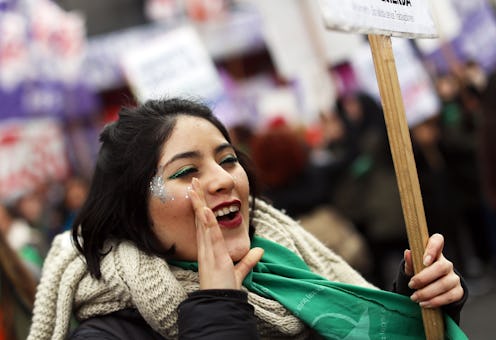News
Argentina Just Took A Historic First Step Toward Abortion Rights

Argentina may be poised to decriminalize abortion for the first time in 97 years. The government's Chamber of Deputies narrowly voted in favor of a legalization bill on Thursday, and though its success in the Senate is far from guaranteed, the passage of Argentina's abortion rights bill in the lower house marks a huge step forward for the country's women's rights movement.
The bill barely passed the chamber. The 129-person Chamber of Deputies debated it for over 22 hours — the Buenos Aires Times reported that the politicians exhibited "visible exhaustion" afterward — and it seemed destined to fail until two lawmakers changed their mind at the last minute and added their support. Ultimately 129 members voted in favor of the measure, 124 against, and one chose to abstain.
Next, it must pass the Senate and get at least tacit approval from President Mauricio Macri, who has said that he disapproves but won't veto it; bills become law within 10 days in Argentina unless the president stops them. According to the Buenos Aires Times, the Catholic Church is also resisting the measure. Argentina is a heavily Catholic country (Pope Francis is from Buenos Aires), but abortion has gained more support there in recent years. Some Argentinian polls this spring suggested that between 57 and 66 percent of the country wants abortion to be legalized.
A parallel trend to the increasing acceptance of abortion in recent years is the declining importance of faith to Argentinians. In 2013, Foreign Policy noted the "church's slow decline" and even partially blamed the fact that the church has "alienated itself from women parishioners with its inflexible stance on reproduction."
Argentina outlawed abortion as a general rule in 1921, though it has allowed women to terminate pregnancies when their health is at risk. Another exception has been permitted for women with mental disabilities who were raped; this rule was expanded in 2012 to allow all rape victims to seek abortions.
But abortion hasn't been a legal option for most women in nearly a hundred years, and its criminalization has forced many to seek secret — and often unsafe — ways of getting the procedure. Researcher Mariana Romero told The New York Times that complications from these covert abortions are the leading cause of maternal deaths in Argentina. "There are between 45,000 to 60,000 hospitalizations derived from clandestine abortions every year," politician Brenda Austin told the paper. "Those who are against legal abortion are in favor of clandestine abortions."
It is particularly hard for low-income women to afford safer versions of these secret abortions. "For poor women there has been an unwritten death penalty in our legal system because they pay for the decision to interrupt a pregnancy with their lives," Dora Barrancos told Argentina's Congress in a hearing about the bill on April 10.
"We can't keep favoring rich women who have access to misoprostol [a pill that induces abortion] while the poor only have access to parsley sticks," journalist Luis Novaresio said before Congress.
According to Telesurvtv.net, this spring marked the seventh time in 11 years that the abortion bill was brought before the Argentine Congress' lower chamber. If the measure goes on to pass the upper chamber and President Macri upholds his promise not to veto it, Argentinian women will be allowed to have abortions within 14 weeks of getting pregnant.
But the bill may not be successful. The BBC reports that it must overcome "an uphill battle" in the Senate, where many conservative members are already known to oppose it. The measure is expected to go up for a vote there in September.